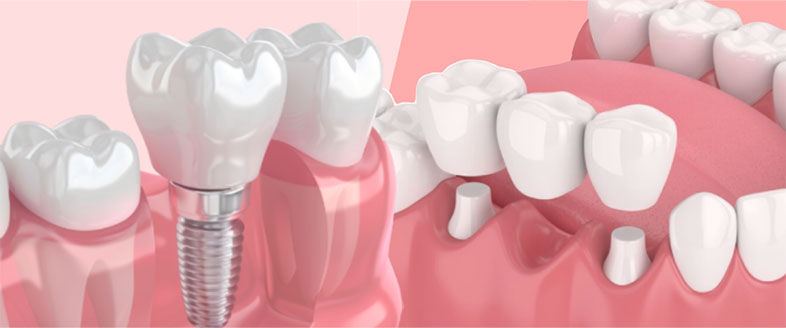Do you find yourself hiding your smile or struggling to chew your favourite foods because of missing teeth? These are common frustrations, and I see patients dealing with them every day.
Deciding on the right dental treatment can be crucial for maintaining oral health and ensuring the longevity of our smile. When it comes to replacing missing teeth, we're often faced with two leading options: permanent dental bridges and dental implants.
In this article, I will share with you my dental expertise on these two treatments and guide you through understanding different implant types and when an implant is necessary.
Key Takeaways
When Do You Need an Implant?
We recommend that you get an implant if you have lost a tooth or teeth due to decay, diseases, or injury. Our patients with missing teeth often face the following problems:
Issue | Complications |
|---|---|
Gap in your teeth | If you have a missing tooth, it can make you feel less confident when you are speaking or smiling, especially if it is within the smile zone. |
Bad breath & infection risk | When you chew, the gap in your teeth may trap food. The food that gets stuck may then start to biodegrade leading to potential issues with bad breath and a risk of infection. |
Loss of continuous chewing surface | When you lose a tooth, you will lack a continuous chewing surface. This can make it harder to chew properly and digest food. |
Increased risk of cracking/tipping on remaining teeth | Losing surface area and support will increase wear on surrounding teeth. This can increase the risk of cracking or tipping of the lower front teeth. |
Loss of bone support | This can result in further tooth loss in the future. |
Different Implant Types: Permanent Dental Bridge vs Implant

When it comes to tooth replacement, there are 3 options you can choose—dentures, dental implants, and a dental bridge. In most cases, our patients will opt for one of the latter two.
Permanent Dental Bridges
Permanent dental bridges are designed to "bridge" the gap created by one or more missing teeth. A bridge is made up of two or more crowns for the teeth on either side of the gap, with a false tooth/teeth in between. These artificial teeth can be made from a variety of materials including porcelain, to ensure a natural-looking appearance.
Here are the common types of dental bridges:
Dental Implants

Dental implants involve the insertion of a titanium post directly into the jawbone, where it serves as an artificial tooth root. Once the implant has bonded with the bone tissue (a process known as osseointegration), an abutment is placed on top of the implant to hold the new implant crown.
Dental implants can support various dental prosthesis options, including implant-supported bridges. This type of bridge uses dental implants instead of crowns and is a sturdy solution to replace missing teeth, providing a natural appearance and high functionality.
Making the Right Choice: Factors to Consider
Before deciding between a permanent dental bridge and a dental implant, we usually inform our patients about these key differences.
Dental Bridge | Dental Implant | |
|---|---|---|
Treatment | Quicker procedure with no need for surgery. | Requires surgery and prolonged treatment time. |
Cost & Insurance | More affordable initially; CHAS subsidies applicable at dePacific. | Higher upfront cost; Medisave claimable at dePacific. |
Lifespan | May have future tooth decay and a shorter tooth lifespan. | Longer lasting; preserves bone. |
Oral Conditions | Should not consider a dental bridge procedure if you do not have strong supporting teeth. | If you have very resorbed bone, you may not wish to go through the extensive bone grafting procedure that is required before placing an implant. |
Success Rate and Care | Both options have high success rates with proper care. However, regular check-ups and specific oral hygiene practices are required. | |
For more information on pricing and procedures, please refer to our dental bridge and dental implant services.
dePacific’s Approach to Dental Restoration
As a dentist at dePacific Dental, we pride ourselves on a positive approach to dental care, ensuring your comfort and confidence when it comes to your treatment choice. Whether opting for a bridge or an implant, our dental professionals are diligent in guiding our patients through the decision-making process.
If you are concerned with the invasiveness of our dental bridge treatment or dental implant surgery, we make sure to use a gentle and caring approach to your treatment. Even after the treatment, we will schedule timely consultations to monitor your oral health.
Let dePacific Dental Protect Your Smile

We understand the importance of maintaining a healthy, radiant smile. That's why, at dePacific, we'll guide you through the decision between a permanent dental bridge or an implant. Let’s begin your journey to better dental health:
To decide whether dental bridges or dental implants are more suitable for you, schedule your consultation with a dental professional today.

